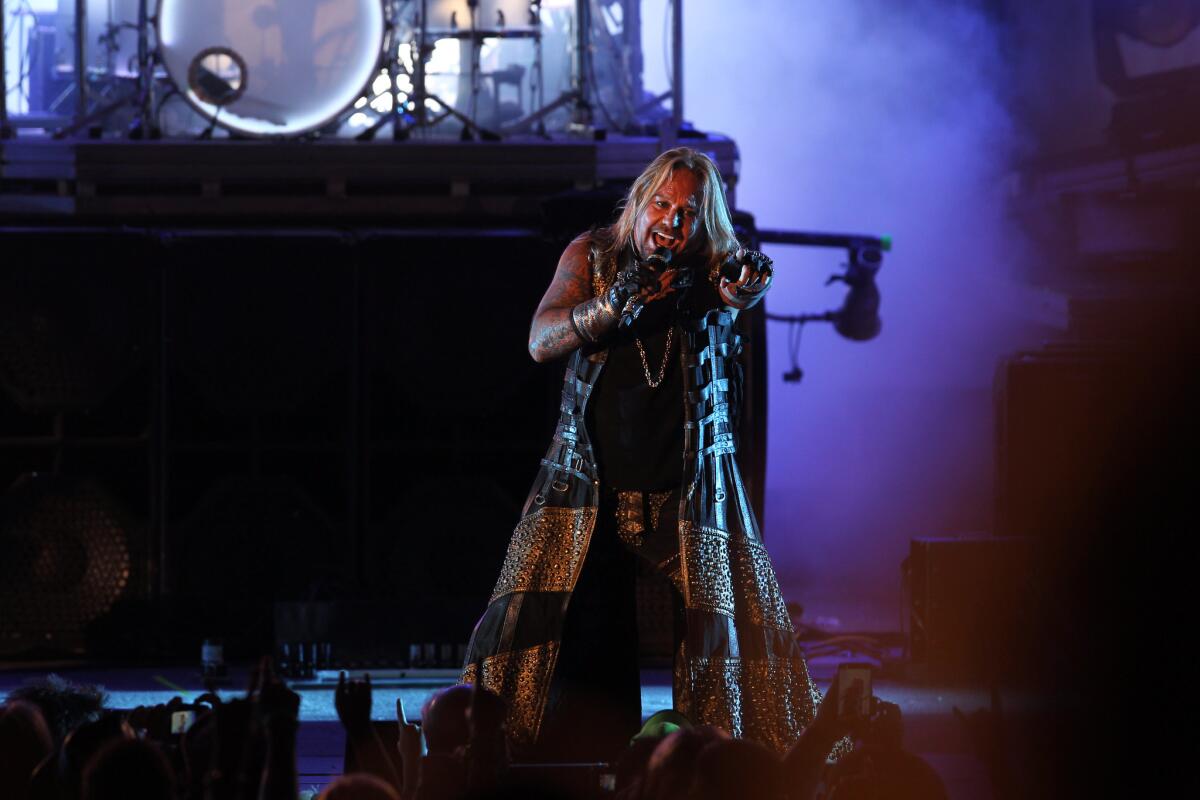Review: Motley Crue goes out with a bang at Hollywood Bowl

Motley Crue frontman Vince Neil revs up the crowd during a victory lap Monday night at the Hollywood Bowl as part of the band’s farewell tour.
Explosions rocked the Hollywood Bowl early. Fireballs during Mötley Crüe’s “Saints of Los Angeles,” the opening song of the metal band’s farewell tour, pushed heat into the cheap seats.
But bombast was required. Not half an hour earlier Alice Cooper had been guillotined on that storied stage, his head landing in a basket that sexy zombie nurses then waved before the crowd like a trophy. There was fake blood everywhere. How do you follow that on a Monday night?
Through 90 minutes of flash and zing, along with any number of the Crüe’s power metal hooks and recognizable licks, its snapshot verses and scream-along choruses. Also useful are big bangs, fog bombs, sparkle showers, Roman candles, solos and wails and lots of songs about girls, girls and girls.
Playing the biggest hits and deeper cuts that the dual-umlauted band — Vince Neil, Nikki Sixx, Mick Mars and Tommy Lee — kick-started a few miles west on the Sunset Strip, the Crüe bid adieu to its many black-clad fans and to Hollywood with a concert that celebrated the pop-metal outfit’s 30-plus-years output.
The set and the band’s work burst from a moment when glistening, testosterone-dense metal bands including Guns N’ Roses, Poison, Ratt and L.A. Guns overtook the Strip in the 1980s to create a scene as wild and raucous as it was ridiculously outfitted. The Crüe was among the most glam-inspired — guitarist Mars, a ghostly, imposing presence, knows his way around a riff — and lyrically hellbent on unzipping pants and worshipping a cartoon devil.
All these years later, the Crüe have ended up as the Gary Busey of rock bands. Though not the biggest, best, most dangerous or innovative, its mere survival is both notable and somehow admirable. From its 1981 debut album, “Too Fast for Love,” onward, its antics have attracted attention, often for the wrong reasons (and wronger reality shows). Its trio of multiplatinum albums stretching from 1983-87 dominated the charts, even if most critics weren’t down.
But the Crüe endured, and on Monday the band’s victory lap showcased music obsessed with Hollywood and the ladies who occupy it. During “Wild Side,” as the evening’s pair of lingerie-clad young women started strutting and grooving, Neil sang of “Hollywood dream teens, yesterday’s trash queens.”
As lithe and charismatic drummer Tommy Lee struck his first cowbell of the set to open “Same Ol’ Situation (S.O.S.),” Neil obsessed over a lesbian betrayal that ends in wedding bells. On their catchiest, best song, “Looks That Kill,” the band compared a would-be lover to a razor, a cat, a car, an unlucky number and a motor — all within the span of a simply structured pop song.
It’s a dirty job, but someone’s gotta do it. Or do they? The downside of Crüe-sanctioned debauchery was on display as well, sometimes disturbingly so. “Live Wire” was a song about a could-be rapist narrator “too hot to stop.” How hot is he when he’s on the prowl? “I’ll either break her face or take down her legs/Get my ways at will.” Did these messages, delivered aggressively (with a borrowed Motorhead riff, no less), indict or celebrate? It was tough to tell through all the fog.
On “Saints of Los Angeles,” the title track from its most recent (and lesser) work, the band offered an ode to L.A. bad boys and their ways with women, localizing it in the process: “Sippin’ at the Troubadour/Girl’s passed out naked in the back lounge/Everybody’s gonna score.” Gross.
A more palatable kind of gross was delivered by Cooper, whose cartoonish brand of proto-metal was joyously ridiculous — and minus any rape talk. Performing bloodied songs about high school rebellion, monsters and nocturnal vacations, Cooper’s performance featured said guillotine, a straight jacket, evil nurses and bloody swords, all presented in good fun. Best, though, was how durable and dense the Detroit-birthed rocker’s music has proven. Unlike the Crüe’s version of evil, Cooper celebrated camp, not creepy aggression.
Twitter: @LilEdit
More to Read
The biggest entertainment stories
Get our big stories about Hollywood, film, television, music, arts, culture and more right in your inbox as soon as they publish.
You may occasionally receive promotional content from the Los Angeles Times.











